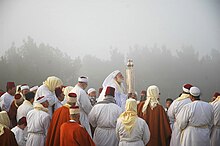Passover (Samaritan holiday)
Passover, known in Hebrew as Pesach, is a significant religious holiday in Samaritanism, commemorating the Israelites' exodus from Egypt and their subsequent liberation from slavery.
The Samaritan Passover is celebrated every spring with a pilgrimage to and sheep sacrifice atop Mount Gerizim,[1][2] the holiest site in the Samaritan religion. This ritual is a direct observance of the commandments found in Exodus 12, and it involves the slaughtering of sheep, dabbing the animals' blood on the participants' foreheads, and roasting the meat for the Passover meal. This practice is a key differentiator from Jewish Passover, where such sacrifices are no longer performed.
Calendar[edit]

Samaritan Passovers are each one day long, followed by the six-day Festival of Unleavened Bread – for a total of seven days.[3] that includes the ancient lamb sacrifice on Mount Gerizim on the 7th day. The lamb is then roasted and consumed as part of the Passover meal.
References[edit]
- ^ Smith, Mike (19 April 2019). "Tiny Samaritan community marks Passover sacrifice as numbers grow". The Times of Israel. Retrieved July 12, 2019.
- ^ Romey, Kristin (April 19, 2019). "The very ancient Passover of one of the smallest religions in the world". National Geographic. Archived from the original on July 12, 2019. Retrieved July 12, 2019.
- ^ Cohen, Jeffrey M. (2008). 1,001 Questions and Answers on Pesach. p. 291. ISBN 978-0853038085.
